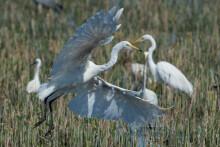
Photo: Waterbirds
view more
Credit Image: Photo: Elie Gaget
Climate change pushes species distribution areas northward. However, the expansion of species ranges is not self-evident due to e.g. habitat degradation and unsustainable harvesting caused by human activities. A new study led from the University of Turku, Finland, suggests that protected areas can facilitate wintering waterbird adaptation to climate warming by advancing their range shifts towards north.
Researchers of the new study investigated the role of protected areas for the range shifts of wintering waterbirds in Europe and North Africa. Species communities were noted to shift faster inside protected areas compared to other areas.
– Range shifts of waterbirds have been over 40 percent faster inside protected areas compared to outside areas. On average, species communities have shifted inside protected areas c. 90 kilometres in 25 years, says Postdoctoral Researcher Elie Gaget from the University of Turku.
Protected areas not only increased the colonisation towards northern areas, but also prevented local extinctions on the southern range of species compared to non-protected areas. This suggests that protected areas can contribute to expand the overall range of species.
In addition to single protected areas, the protected area network as a whole influenced the spread of waterbird species. Shifts in species communities were faster in areas with a dense protected area network compared to areas where the network was sparse.
– Our findings highlight that protected area networks, historically established to fight habitat degradation and over-exploitation of natural resources, are now also important to mitigate the negative effects of climate warming on biodiversity, says Professor Jon Brommer from the University of Turku.
The study is part of an international collaboration that utilised tens of thousands of waterbird surveys covering 97 species from 39 countries during 25 years. The international coordination of surveys has been conducted by Wetlands International and the research was published in the scientific journal of Conservation Biology.
###
TDnews (tunisiesoir.com)














